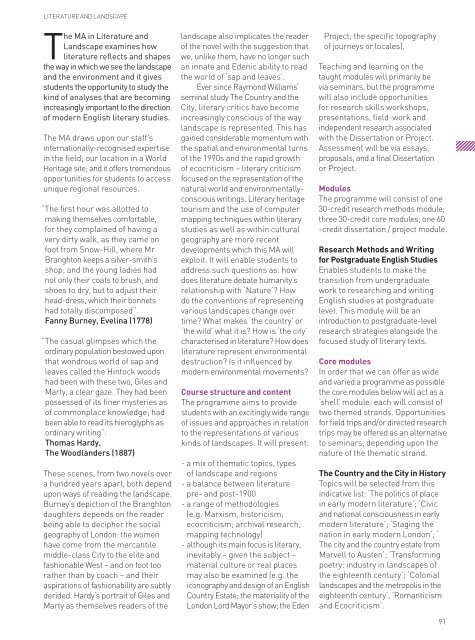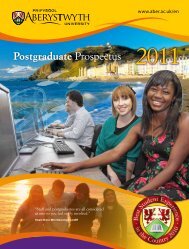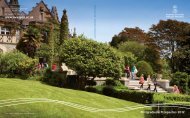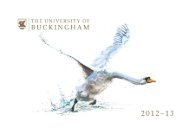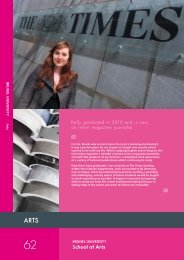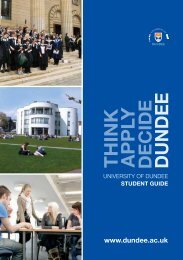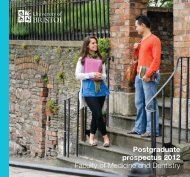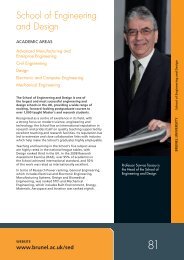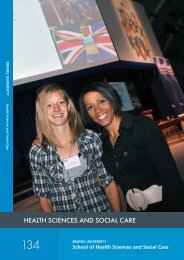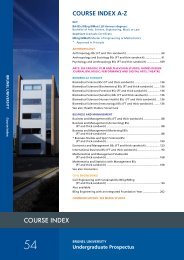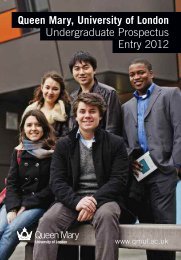BATH SPA UNIVERSITY
BATH SPA UNIVERSITY
BATH SPA UNIVERSITY
- No tags were found...
You also want an ePaper? Increase the reach of your titles
YUMPU automatically turns print PDFs into web optimized ePapers that Google loves.
Literature and LandscapeThe MA in Literature andLandscape examines howliterature reflects and shapesthe way in which we see the landscapeand the environment and it givesstudents the opportunity to study thekind of analyses that are becomingincreasingly important to the directionof modern English literary studies.The MA draws upon our staff’sinternationally-recognised expertise in the field; our location in a WorldHeritage site; and it offers tremendousopportunities for students to accessunique regional resources.“The first hour was allotted tomaking themselves comfortable, for they complained of having avery dirty walk, as they came onfoot from Snow-Hill, where MrBranghton keeps a silver-smith’sshop; and the young ladies hadnot only their coats to brush, andshoes to dry, but to adjust theirhead-dress, which their bonnets had totally discomposed”.Fanny Burney, Evelina (1778)“The casual glimpses which theordinary population bestowed uponthat wondrous world of sap andleaves called the Hintock woodshad been with these two, Giles andMarty, a clear gaze. They had beenpossessed of its finer mysteries asof commonplace knowledge; hadbeen able to read its hieroglyphs asordinary writing”.Thomas Hardy,The Woodlanders (1887)These scenes, from two novels overa hundred years apart, both dependupon ways of reading the landscape.Burney’s depiction of the Branghtondaughters depends on the readerbeing able to decipher the socialgeography of London: the womenhave come from the mercantilemiddle-class City to the elite andfashionable West – and on foot toorather than by coach – and theiraspirations of fashionability are subtlyderided. Hardy’s portrait of Giles andMarty as themselves readers of thelandscape also implicates the readerof the novel with the suggestion thatwe, unlike them, have no longer suchan innate and Edenic ability to readthe world of ‘sap and leaves’.Ever since Raymond Williams’seminal study The Country and theCity, literary critics have becomeincreasingly conscious of the waylandscape is represented. This hasgained considerable momentum withthe spatial and environmental turnsof the 1990s and the rapid growth of ecocriticism – literary criticismfocused on the representation of thenatural world and environmentallyconsciouswritings. Literary heritagetourism and the use of computermapping techniques within literarystudies as well as within culturalgeography are more recentdevelopments which this MA willexploit. It will enable students toaddress such questions as: how does literature debate humanity’srelationship with ‘Nature’? How do the conventions of representingvarious landscapes change overtime? What makes ‘the country’ or‘the wild’ what it is? How is ‘the city’characterised in literature? How doesliterature represent environmentaldestruction? Is it influenced bymodern environmental movements?Course structure and contentThe programme aims to providestudents with an excitingly wide rangeof issues and approaches in relationto the representations of variouskinds of landscapes. It will present:- a mix of thematic topics, types of landscape and regions- a balance between literaturepre- and post-1900- a range of methodologies (e.g. Marxism, historicism;ecocriticism; archival research;mapping technology)- although its main focus is literary,inevitably – given the subject –material culture or real places may also be examined (e.g. theiconography and design of an EnglishCountry Estate; the materiality of theLondon Lord Mayor’s show; the EdenProject; the specific topography of journeys or locales).Teaching and learning on thetaught modules will primarily be via seminars, but the programmewill also include opportunities for research skills workshops,presentations, field-work andindependent research associatedwith the Dissertation or Project.Assessment will be via essays,proposals, and a final Dissertation or Project.ModulesThe programme will consist of one30-credit research methods module;three 30-credit core modules; one 60-credit dissertation / project module.Research Methods and Writingfor Postgraduate English StudiesEnables students to make thetransition from undergraduatework to researching and writingEnglish studies at postgraduatelevel. This module will be anintroduction to postgraduate-levelresearch strategies alongside thefocused study of literary texts.Core modulesIn order that we can offer as wideand varied a programme as possiblethe core modules below will act as a‘shell’ module: each will consist oftwo themed strands. Opportunitiesfor field trips and/or directed researchtrips may be offered as an alternativeto seminars, depending upon thenature of the thematic strand.The Country and the City in HistoryTopics will be selected from thisindicative list: ‘The politics of place in early modern literature’; ‘Civicand national consciousness in earlymodern literature’; ‘Staging thenation in early modern London’; ‘The city and the country estate fromMarvell to Austen’; ‘Transformingpoetry: industry in landscapes ofthe eighteenth century’; ‘Coloniallandscapes and the metropolis in theeighteenth century’, ‘Romanticismand Ecocriticism’.91


